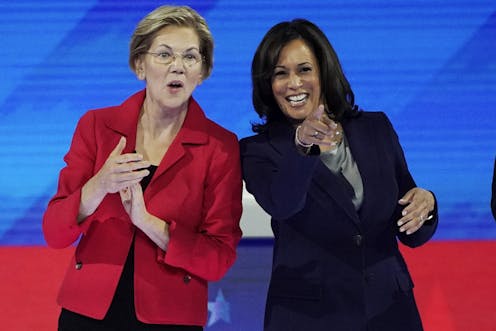Reparations are essential to eliminating the substantial wealth gap between black and white Americans
- Written by Christian Weller, Professor of Public Policy and Public Affairs, University of Massachusetts Boston

Four hundred years ago, America’s first enslaved Africans arrived[1] in Virginia.
Centuries later, black Americans have managed to accumulate some wealth, but it still pales in comparison to that of whites. This racial wealth gap is a result not only of the horrors of slavery but also policies – such as Jim Crow laws[2], redlining[3] and modern-day mass incarceration[4] – that followed.
The average white family with at least one working adult over 25 years old owned more than nine times as much total wealth[5] as a black one in 2016.
As a scholar of wealth inequality[6] and its causes, I believe the promise of equal opportunity for all remains unfulfilled as long as this massive gulf persists. A variety of proposals have been suggested[7] by Democratic candidates for president and others to close this gap, such as eliminating housing discrimination and making college free for all.
Two colleagues and I created an economic simulator[8] to model the impact of five of the most ambitious proposals. Our results show why reparations that directly target African Americans are likely the only way to eliminate it.
Why wealth matters
This wealth gap matters a lot because it means African Americans have far fewer opportunities to get ahead and less economic security.
Wealth is what allows families to start a business, send their children to college, switch jobs when new opportunities arise, buy a house and retire comfortably. It’s also what helps people get through unexpected financial hits, such as a layoff, medical emergency or simply a leaky roof.
Although whites generally have more wealth than every other racial and ethnic group, the gap between them and African Americans is particularly large.
For example, the average white family had US$935,584 in wealth in 2016[9], compared with $102,477 for blacks and $176,635 for Latino households[10].
Importantly, this gap between African Americans and whites persists even when we account for education[11]. And the gap worsens with age[12]. African Americans are much worse prepared for retirement, for instance, than whites are.
Five proposals to reduce the gap
My colleagues Danyelle Solomon[13], Connor Maxwell[14] and I put together a simulation model[15] to examine the effectiveness of five proposals offered by Democratic candidates[16] and progressive experts[17] to close the racial wealth gap.
The creation of “baby bonds[18],” which involve the government opening an interest-bearing account for every child born in the U.S. and adding new funds annually until the age of 18
Elimination of housing segregation and mortgage market discrimination[19] such as redlining
Making college tuition free[20] for everyone and eliminating existing student debt
Creating universal retirement savings plans[21] that are low cost and low risk, which would disproportionately benefit families of color
Effective enforcement of consumer finance regulations[22] to eliminate predatory interest rates and fees, and ensure equal access to affordable[23] financial products.
We modeled how each plan would affect the earnings and savings of people starting out their careers in 2020, at age 25, until retirement 40 years later. Importantly, we used the broadest possible versions of these proposals in our model, which meant that the impact on the racial wealth gap would likely be larger than the actual plans put forth by the politicians.
We found that baby bonds led to the single largest effect. They would close 24% of the gap by the time people retire. The other policies had much more modest effects, with effective financial regulation having the smallest impact. It would only shrink the gap by 1.5%.
Even if all five proposals were enacted next year, blacks would still possess just 52% of the wealth owned by whites by by 2060, leaving a gap of more than $1 million.
A 400-year head start
The proposals we simulated are progressive and disproportionately help African Americans, and there are good reasons to pursue each policy to help close the black-white wealth gap.
But every one of them also offers assistance to white families, who have a 400-year head start building wealth in America. Our research suggests to eliminate the gap altogether requires pursuing policies[24] that exclusively target African Americans and help them build up enough wealth to match that of whites.
In other words, some form of reparations – whether in the form of lump sum transfers or creating funds[25] that help blacks buy homes or start a business – needs to be part of the debate.
[ You’re smart and curious about the world. So are The Conversation’s authors and editors. You can read us daily by subscribing to our newsletter[26]. ]
References
- ^ America’s first enslaved Africans arrived (www.nytimes.com)
- ^ Jim Crow laws (theconversation.com)
- ^ redlining (theconversation.com)
- ^ modern-day mass incarceration (www.naacp.org)
- ^ nine times as much total wealth (www.americanprogress.org)
- ^ scholar of wealth inequality (scholar.google.com)
- ^ variety of proposals have been suggested (www.vox.com)
- ^ created an economic simulator (www.americanprogress.org)
- ^ US$935,584 in wealth in 2016 (www.americanprogress.org)
- ^ $176,635 for Latino households (www.americanprogress.org)
- ^ even when we account for education (www.bostonfed.org)
- ^ gap worsens with age (www.americanprogress.org)
- ^ Danyelle Solomon (www.americanprogress.org)
- ^ Connor Maxwell (www.americanprogress.org)
- ^ simulation model (www.americanprogress.org)
- ^ Democratic candidates (www.vox.com)
- ^ progressive experts (www.americanprogress.org)
- ^ baby bonds (www.washingtonpost.com)
- ^ mortgage market discrimination (www.cnn.com)
- ^ Making college tuition free (www.vox.com)
- ^ retirement savings plans (www.edd.ca.gov)
- ^ consumer finance regulations (consumerfed.org)
- ^ equal access to affordable (elizabethwarren.com)
- ^ pursuing policies (www.nytimes.com)
- ^ creating funds (cas2.umkc.edu)
- ^ You can read us daily by subscribing to our newsletter (theconversation.com)
Authors: Christian Weller, Professor of Public Policy and Public Affairs, University of Massachusetts Boston

